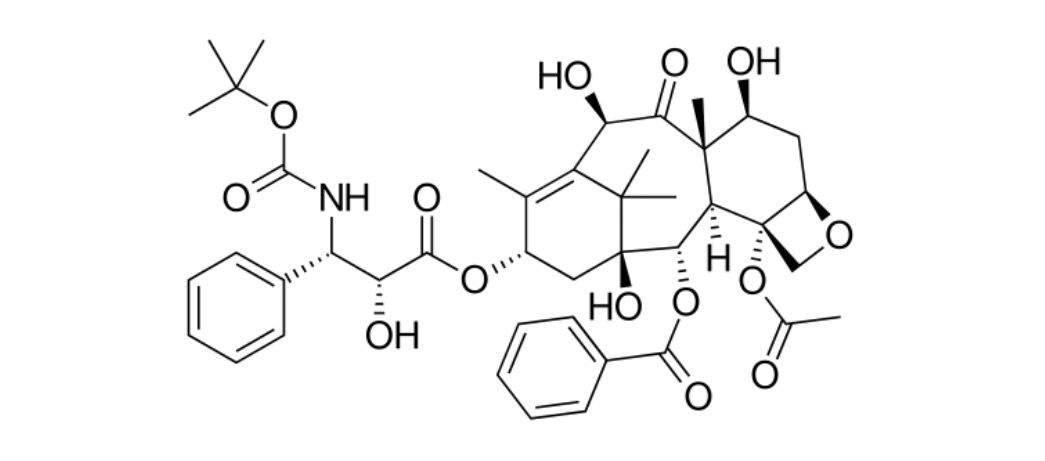Docetaxel

Overview
Docetaxel is a taxane-class chemotherapy medicine widely used in the treatment of various solid tumors including breast cancer, non-small cell lung cancer, prostate cancer, gastric cancer, and cancers of the head and neck. It works by stabilizing microtubules and disrupting normal cell division, leading to cancer cell death. Administered intravenously, Docetaxel is often combined with other chemotherapy agents or targeted therapies to improve treatment outcomes. Its role in oncology has expanded over the years due to its ability to improve overall survival and progression-free survival in advanced and metastatic cancers. Despite being an effective anticancer therapy, it requires careful management due to its toxicity profile and potential adverse effects.
Background and Date of Approval
Docetaxel was developed as a semi-synthetic analogue of paclitaxel derived from the needles of the European yew tree. It belongs to the taxoid family of antineoplastic agents. The U.S. Food and Drug Administration first approved Docetaxel in 1996 for locally advanced and metastatic breast cancer, and later expanded approvals to include non-small cell lung cancer, metastatic castration-resistant prostate cancer, advanced gastric adenocarcinoma, and squamous cell carcinoma of the head and neck. The European Medicines Agency and other global regulatory bodies have also authorized its use across a broad spectrum of cancers. Clinical trials demonstrated significant improvements in survival, tumor response, and disease control, solidifying Docetaxel as a cornerstone chemotherapy agent in oncology practice.
Uses
Docetaxel is indicated for breast cancer, both in early-stage adjuvant settings and in advanced or metastatic disease, where it can be used alone or in combination with anthracyclines and cyclophosphamide. In non-small cell lung cancer, it is prescribed for locally advanced or metastatic disease, often in combination with cisplatin. For metastatic castration-resistant prostate cancer, it is used with prednisone to improve survival and symptom relief. In gastric cancer, Docetaxel is administered with cisplatin and fluorouracil for advanced cases. It is also used in combination regimens for squamous cell carcinoma of the head and neck. Beyond approved uses, ongoing research evaluates its role in other solid tumors and novel drug combinations.
Administration
Docetaxel is given as an intravenous infusion, typically every three weeks. The dose depends on cancer type, patient body surface area, and treatment regimen. Standard dosing ranges from 60 mg/m² to 100 mg/m², with adjustments required for liver impairment or prior toxicities. Premedication with corticosteroids such as dexamethasone is recommended to reduce the risk of hypersensitivity reactions and fluid retention. Patients require regular monitoring of blood counts, liver function, and overall performance status to guide dose modifications and ensure safe treatment delivery.
Side Effects
Docetaxel commonly causes neutropenia, anemia, fatigue, fluid retention, alopecia, nausea, vomiting, diarrhea, stomatitis, nail changes, and peripheral neuropathy. Many of these effects are temporary and manageable with supportive care, dose adjustments, or growth factor support. Hair loss and nail changes are highly visible side effects but are reversible after treatment ends. Patients often experience fatigue during therapy, which may improve over time.
Warnings
Serious adverse events associated with Docetaxel include severe neutropenia leading to infection, febrile neutropenia, hypersensitivity reactions, hepatotoxicity, cardiac toxicity, and interstitial lung disease. Rare but potentially life-threatening complications include severe fluid retention, sepsis, and treatment-related death. Patients with pre-existing liver impairment are at higher risk and require dose reductions or treatment discontinuation. Docetaxel should not be administered to patients with baseline neutrophil counts below recommended levels due to infection risk.
Precautions
Docetaxel should be used with caution in patients with liver disease, poor performance status, or pre-existing neuropathy. Concomitant use with strong CYP3A4 inhibitors may increase Docetaxel exposure and toxicity, requiring dose adjustments or alternative therapy. Vaccinations with live attenuated vaccines should be avoided during treatment due to immunosuppression. Women who are pregnant or breastfeeding should not take Docetaxel, and effective contraception should be used during therapy and for some time afterward.
Expert Tips
Premedication with corticosteroids is essential to minimize hypersensitivity and fluid retention risks. Regular monitoring of complete blood counts and liver function tests is required before each cycle. Pharmacists should counsel patients on the importance of adhering to premedication schedules and recognizing early signs of infection, neuropathy, or severe fatigue. Hydration and supportive therapies can help mitigate toxicities. Patient education on temporary alopecia and nail changes can improve adherence and psychological coping during treatment.
